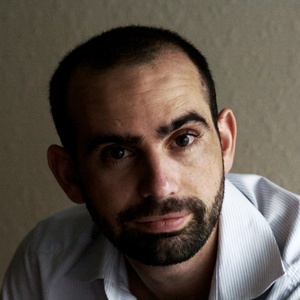Position: Founder
Background: Over the past two years, Davide’s company, 39 inc., has been continually contacted by those needing assistance in building their iPhone applications. Realizing there wasn’t a streamlined process for connecting iPhone developers with potential clients, Davide created GetAppsDone.com, a place where companies and iPhone developers can connect with each other.
Links: http://www.getappsdone.com/; http://39inc.com/
Ken: Once someone has an iPhone app idea and has validated it’s a good idea to pursue, what do you consider to be the next steps in building the app?
Davide: They should write down on a piece of paper (that white thing some people still use) all the features they came up with for their application, and cross out at least half of them because I’m sure they won’t need them. People still confuse iPhone applications with desktop applications. For instance, for the Get Apps Done iPhone application, it could make sense to send out a resume, but the question is, would you send out the resume that could help you find your next job from a phone, or would you rather do it from a desktop or laptop where you could make sure everything is perfect?
Once you nail down the list of features you need, then it’s time to find the right developer for it. I talk about developer, but in my opinion, working with teams (designer plus developer) is always better than working with a single person. The designer will help you create the right user experience while the developer can help you refine the features of your app.
Ken: Some individuals and companies don’t have access to those who know how to build iPhone apps. Where are the best places to start looking for help? How does GetAppsDone.com assist with that and how does this differ from other options available?
Davide: Posting a (free) ad on GetAppsDone.com is a good way to start, but there are many other ways, like looking for a local developer group on sites like Meetup.com or openly asking on Twitter.
GetAppsDone.com differs from all those “rent-a-coder” sites because we don’t have a bidding system. In our case, not having that feature adds a lot of value, because we don’t create a race to the bottom for the prices that usually favor lower-quality work. Often, whoever is looking for resources doesn’t understand how it is possible to receive bids from $1,000 to $10,000 for the same project, so they just go for the cheapest. With GetAppsDone.com, we let the developer contact the solicitor directly, giving them the opportunity to present themselves as they desire.
Ken: Since iPhone design and development is a hot space, these skills are now listed on everyone’s resume. How do you filter and vet those who are accomplished versus those who are just looking to monetize on someone’s inexperience?
Davide: A good idea is to ask for work examples and previous clients’ references. Other than that, it is really hard to judge the real knowledge of a developer without being technical.
A trick that I have is never to hire “yes” people. You want your developer to be honest with you and you want them to say “no” when they see something wrong in your idea. Starting with the assumption that there’s always something wrong or not cost-effective in an idea, your developer should help point out some problematic feature request at least once.
Ken: From what you’ve seen, how long does it usually take to build an iPhone app once the right resources are in place? What areas do first-time app publishers under- or overestimate?
Davide: Time frames are all over the place. Usually, those looking for help underestimate the number of changes they will request during the process. No matter how little and simple they look from the outside, sometimes they require a lot of work “under the hood.” I always try to underpromise so that I have room for those changes, and no client will ever complain if we deliver an application earlier than estimated.
People also underestimate everything that comes after the application development: marketing, PR, and customer service. Those are key elements for the success of an application.
Ken: What aspects of creating an app can be done in parallel? What can’t? Are there ways to get apps done faster besides having more resources available?
Davide: Design and development. We usually prepare a wireframe of how the application should work, including areas and spaces for different elements, so that we can work on the development and the polished design elements at the same time. Then, we just need to swap the less-finished elements with the final ones.
As far as the best way to get apps done faster and in a cost-effective way, my suggestion can be condensed to three words: keep it simple. Don’t try to squeeze every feature you see in your favorite apps; just pick the one or two features your application really needs and try to make those perfect.
Ken: Although it can vary greatly, what guidance or framework can you provide to those trying to evaluate the cost of developing an app? What ranges are you seeing in the market? How can costs be reduced? Where should costs not be reduced?
Davide: Again, costs are all over the place. If we look at the U.S. market, I would say for an application that uses custom design and a few API calls, the range could be between $5,000 and $10,000.
My suggestion is to try to use developers who already built apps similar to yours and ask them if they can reuse any of the code they already wrote. I always try to help our clients to save money, not undervaluing our service but offering smarter solutions. And keep in mind that a $20-per-hour developer isn’t always cheaper than a $100-per-hour developer. I’ve worked with developers who, even though they are more expensive, were saving me money by being faster and more responsive.
Company: Mobilmeme, Inc., which operates AppStoreHQ and iPhoneDevSDK
Position: Executive chairman
Background: AppStoreHQ is a leading smartphone discovery platform.
Link: http://www.appstorehq.com/
Ken: What sorts of skills are needed to build an app? What does an ideal team look like?
Chris: Apart from platform-specific knowledge about the unique capabilities of the device (e.g., using the camera or accelerometer, or delivering push messages), the core skills are the same as for any software development project. The following are skill areas, not head-count requirements, but on bigger projects they often fall to specialists with experience in each discipline:
- Product leadership
Understanding customer needs, defining user scenarios, keeping the team on track
- User experience/user interface design
Creating logical and concise user flows, integrating visual and other creative assets (artwork, audio, video, animation) to create an engaging experience
- Software development
Creating the logic and process layers required to deliver the envisioned experience: authenticating users; capturing, accessing, and presenting data; performing logic functions; integrating with other phone- and web-based systems, and so on
- Testing
Systematically performing all the intended functions of the applications to identify any software or design errors; testing supporting infrastructure for scalability, load, and potential errors caused by dependencies on third-party systems
Ken: Some individuals and companies don’t have access to those who know how to build apps. What are the best places to start looking for help?
Chris: Literally thousands of firms are scattered around the world that develop apps for hire, but the capabilities of these firms, and the [resultant] quality of the applications they develop, can vary widely. The best place to start your search is among developers who have already successfully published apps of the type and quality you have in mind. The best-known publishers of top-selling apps rarely work on contract, but there are hundreds of lesser-known but extremely skilled developers who do. Look for existing apps in the category you’re focused on that deliver the quality of experience you’d like to achieve, and get in touch with the developers directly (a directory of published developers, with filters for category, number of published apps, and average rating, can be found at http://www.appstorehq.com/developers).
Ken: From what you’ve seen, how long does it usually take to build an app once the right resources are in place? What areas do first-time app creators under- or overestimate?
Chris: The answer obviously varies widely, based both on the complexity of the app and on the skills and capabilities of the team, but a typical project will take between two and three months from start to submission for approval, with that last step requiring another two weeks (if you’re lucky) or longer (if you’re not), or resulting in outright rejection (if you’re pushing the boundaries of what Apple has decided to allow that week).
Ken: What aspects of creating an app can be done in parallel? What can’t? Are there ways to get apps done faster besides having more resources available?
Chris: Projects don’t often get bogged down at the handoffs between functions like design and development; the greatest enemies of on-time delivery are poor upfront planning and mid-project changes in direction. The best way to ensure a smooth and rapid development process is to come into the engagement with a clear set of goals for your application and provide key assets like content, artwork, and legal approvals well in advance. You can also remove friction from the development process along the way by providing clear and timely guidance on strategic decisions as the app development process unfolds (just make sure your mid-stream guidance is consistent with your original goals and vision).
Ken: Although it can vary greatly, what guidance or framework can you provide to those trying to evaluate the cost of developing an app? What ranges are you seeing in the market? How can costs be reduced? Where should costs not be reduced?
Chris: App development is like any other complex project: time, cost, and quality are fundamental constraints, and making changes on any one of these vectors will necessarily impact the other two. Want your app built in a hurry? Expect to pay more and get less functionality and polish than you would if you allowed more time. Working with a tight budget? Plan to limit scope and allow extra time if you’d still like to deliver a quality experience. Based on recent market data, $5,000 is the minimum you should expect to pay for a basic app delivered with reasonable quality, but it’s not uncommon for budgets to run an order of magnitude higher.
Ken: On the flip side, how should app designers and developers think about pricing their services? Where do they typically under- or overestimate costs? How can they best promote themselves in a hot but increasingly competitive market?
Chris: The best way for app development firms to command a premium price is to consistently deliver great work for clients with recognizable brand names. This is even more effective if you specialize in a particular domain, whether it’s games or utilities. Deliver a great shopping app for a well-known brand and every product manager that competes with or aspires to emulate that brand will come knocking, asking you to do the same for them. If you haven’t yet built a noteworthy app, consider building one at reduced rates for a marquee client. If the app you deliver is good, the lost revenue from that project will pay for itself several times over in referrals and new-client inquiries. And if you constantly find yourself going over budget, look hardest at your customer communication and project management practices—the root cause is most often here (and not in functional disciplines like design or development).
Get App Savvy now with the O’Reilly learning platform.
O’Reilly members experience books, live events, courses curated by job role, and more from O’Reilly and nearly 200 top publishers.



